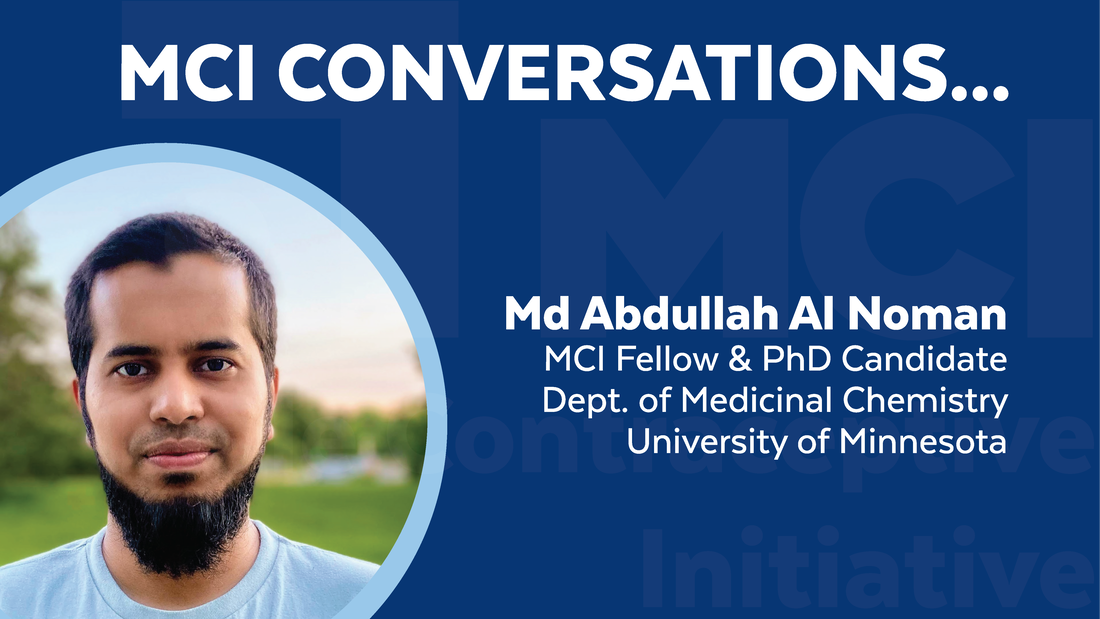|
Md Abdullah Al Noman is a PhD candidate in the Department of Medicinal Chemistry at the University of Minnesota. He has been working with MCI grantee Dr. Gunda Georg, on the development of male contraceptive agents. He was named as one of MCI’s 2020 predoctoral fellows and in this blog post he shares what he hopes to learn as a fellow and discusses the challenges in the field of male contraception What have you focused your studies on? How does that relate to male birth control? The goal of my graduate studies is to develop a birth control pill for men by targeting a protein called RARα which is essential for sperm production. Disrupting RARα signaling will inhibit sperm production and produce reversible contraceptive effects in men. I have been designing and synthesizing potential disruptors of RARα signaling to develop a male birth control pill with some promising results. Why were you excited to work with MCI? What do you see that you bring to MCI? MCI addressed a critical unmet public health need. Despite the demand from the end-users, no male contraceptive agent is available yet, and MCI’s core mission is to address the need. I was excited about the trainee support provided by MCI: the fellowship and travel grants are unique opportunities for graduate students engaged in male contraceptive research, and this support from MCI will attract prospective graduate students wishing to pursue a career in male contraceptive research and help those who are already engaged in such research to advance their career. Also, fellowships and travel grants being available to all trainees regardless of nationality opens the opportunities for international graduate students like me. I have been working to develop a preclinical male contraceptive candidate for the last three years using various medicinal chemistry tools. I wish to utilize these tools along with learning new skills for interdisciplinary research to develop a male contraceptive agent. What skills would you like to learn or develop while with MCI? As an MCI fellow, I expect to hone my skill to work in an interdisciplinary research area. Successful completion of my proposed research would teach me pursuing independent research, fulfilling expected timeline, learning new skills, and coordinating efficiently across various disciplines. What are your interests and how do those relate to male contraception? My research interest primarily lies in small molecule drug discovery including ligand design, computational evaluation, organic synthesis, and bioassay. An orally available small molecule drug would be ideal for male contraceptive pill since oral administration is the preferred route of drug intake. I expect my research project to bring forth preclinical candidate(s) for male contraception that would be effective upon oral administration. What is your connection to, or interest in, contraception? Contraceptive is a global need for the prevention of unintended pregnancy. Making contraceptive methods available and accessible will assist in family planning and promote a healthier population. Though there are many contraceptive pills available for women, no contraceptive pill is approved for men yet. So, women disproportionately assume the responsibility of contraception, and a male contraception pill will allow the male partner to share that responsibility. I have been working in the Georg group at the University of Minnesota where developing a male contraceptive agent is a major goal of the group. Being in an interdisciplinary environment like the Georg group where many aspects of drug discovery are studied for various male contraceptive targets, I am developing a comprehensive view of the discipline, and it helps me to evaluate the progress of the discipline and to see where my project stands in that progress. What do you think are the biggest challenges affecting contraception, generally, and male contraception, specifically? From a medicinal chemistry perspective, developing a contraceptive agent without significant side effects is a great challenge. Given the need for routine administration over a long period, minor side effects could become a major inconvenience in the long run. For the male contraceptive, the same challenge poses a bigger threat since men don’t have to trade-off between pregnancy and minor contraceptive side effects. So, the threshold for side effects is even lower for male contraceptive agents. Another challenge for male contraceptive is lack of effort, or disclosed effort, from big pharmaceutical industries to develop a male contraceptive, given half of the adult population would be a potential user. Do you think these challenges and opportunities have evolved over time? If so, how? Yes, I believe challenges and opportunities have evolved over time. The way we address drug safety has changed a lot. Medicinal chemists have novel tools and assays at their disposal to evaluate drug safety early and better predict human safety from in vitro and animal studies and address those issues soon, decreasing the expensive late-stage attrition. There are more nonhormonal targets for male contraception than hormonal targets. These targets present many ways to develop a safer male contraceptive agent. Also, few academic research groups and startups are working diligently to discover a male contraceptive agent. Organizations like MCI are a critical drive for such research. MCI not only provides support to the research but their awareness and education campaign could also create a greater demand for a male contraceptive agent, potentially attracting many more researchers to join the quest for male contraceptives. What are your hopes for the near and far future of male contraception? What will it take for these to become reality? I expect more researchers to be involved in male contraception research with increased support from both government and private organizations like NICHD and MCI. I also expect that there would be more validated targets for male contraceptive since the number of targets has increased in the last few decades. Also, clinical trials for some non-hormonal candidates could be anticipated in the near future. In the long run, I expect male contraceptive pills to be available along with many non-pill methods. Also, I hope a good safety profile of male contraceptives will make it the preferred method of contraception for many couples. Finally, increased public demand, together with added research funding and greater research effort will bring the quest for male contraceptive to fruition. Noman highlights several potential positive impacts of male contraception on our population. With the upward trend in male contraception research and investment, and dedicated early career investigators like Noman, having a future with an expanded contraceptive method mix looks promising. Interested in learning more about Noman? You can read about the exciting research he is facilitating at the Georg group here.
Comments are closed.
|
Categories
All
Archives
June 2024
|
|
|
Donate to Male Contraceptive InitiativeYour generous donation makes a difference!
|
© Male Contraceptive Initiative. All rights reserved.


 RSS Feed
RSS Feed
